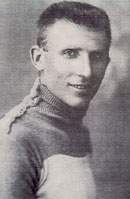
Gerard Friedrich "Gerrie" Knetemann was a Dutch road bicycle racer who won the 1978 World Championship. He wore the Yellow Jersey early in each Tour de France for four consecutive years between 1977 and 1980.

The 1980 Tour de France was the 67th edition of the Tour de France. The total distance was 3,842 km (2,387 mi) over 22 stages. In the first half of the race, Bernard Hinault started out strong by winning the prologue and two stages. However, knee problems forced Hinault to abandon the race while still in the lead. Joop Zoetemelk became the new leader, and defended that position successfully. Just as in 1979, when Hinault and Zoetemelk finished nearly a half hour ahead of the rest of the field, the 1980 edition was a battle between these two riders until Hinault abandoned. At the time Hinault was just 21 seconds ahead of Zoetemelk and the race was about to enter the Pyrenees. Zoetemelk did not wear the yellow jersey during stage 13 though he did in every stage thereafter finishing the race with nearly a seven-minute advantage over second place Hennie Kuiper. It was his first Tour victory in his tenth attempt, after already having finished second in five editions.

Michel Pollentier is a Belgian former professional road bicycle racer.

Alfons ("Fons") De Wolf is a retired Belgian road race cyclist, a professional from 1979 to 1990. He represented his country at the 1976 Summer Olympics in Montreal, Canada.

Eddy Planckaert is a Belgian former professional road racing cyclist. In 1988, Planckaert enjoyed perhaps his best year by capturing the green jersey at the 1988 Tour de France and winning the Tour of Flanders. In 1990, he won Paris–Roubaix, his second monumental classic, with the closest finish in the race's history beating Canadian Steve Bauer by less than a cm. A strong sprinter, Planckaert is one of the riders with stage wins at all three cycling Grand Tours.

Joseph "Jef" Planckaert was a Belgian racing cyclist. He is seen as one of the best Belgian cyclists of the 1950s and 1960s.

Frank Hoste is a retired Belgian racing cyclist, who won the points classification in the Tour de France in 1984 as well as three stage victories. Hoste was a professional cyclist from 1977 to 1991, then he started a bicycle factory.

Ludo Peeters is a former Belgian professional road bicycle racer. He was professional from 1974 to 1990. He rode ten editions of the Tour de France and won 3 stages, one in 1980, one in 1982 and one in 1986. He also wore the yellow jersey as leader of the general classification for one day in 1982 after his stage win and also in 1984.

Willy Van Neste is a retired Belgian professional road bicycle racer who competed as a professional from 1966 to 1976. He participated in seven editions of the Tour de France, where he won a stage in the 1967 Tour de France and wore the yellow jersey as leader of the general classification for the following day. Other career highlights include winning the Four Days of Dunkirk in 1970, the Züri-Metzgete in 1972 and Grand Prix de Fourmies in 1967. He also finished second in the 1968 Gent–Wevelgem and the 1970 Amstel Gold Race.

Julien Schepens was a Belgian professional road bicycle racer. He won a stage in the 1960 Tour de France and also wore the yellow jersey for one day after his stage win. Other career highlights include stage wins in Paris–Nice and Four Days of Dunkirk as well as winning the Grand Prix de Denain in 1962.

Omer Huyse was a Belgian professional road bicycle racer. In 1924, he won stage five of the 1924 Tour de France. In that year, the cyclists were divided in three classes: the first class for top cyclists, the second class for lesser cyclists, and the touriste-routier class for semi-amateur cyclists. Huyse was put in the second class cyclists, so his stage victory was extra special.

Lucien Storme was a Belgian professional road bicycle racer. He won the 1938 Paris–Roubaix. In December 1942, he was taken prisoner by the Germans for smuggling. In 1945, at the end of the Second World War, he was accidentally shot by the Americans.

Maurice Blomme was a Belgian professional road bicycle racer. He competed in the team pursuit event at the 1948 Summer Olympics. In 1950, Blomme was the winner of the 12th stage of the 1950 Tour de France.

Albert Van Vlierberghe was a Belgian professional road bicycle racer. Van Vlierberghe won three stages in the Tour de France, and three stages in the Giro d'Italia. He also competed in the team time trial and the team pursuit events at the 1964 Summer Olympics.

Daniel Van Ryckeghem was a Belgian professional road bicycle racer.
Ad Wijnands is a Dutch former professional road bicycle racer, who won two stages in the 1981 Tour de France.
Gilbert Glaus is a retired Swiss professional road bicycle racer. In 1978, Glaus became amateur world champion, and he became a professional cyclist in 1982. In 1983, Glaus won a stage in the 1983 Tour de France, but in the 1984 Tour de France he was the Lanterne rouge. He was the Swiss National Road Race champion in 1982. He also competed in the individual road race and team time trial events at the 1980 Summer Olympics.
Ferdi Van Den Haute is a Belgian former professional road bicycle racer competing from 1976 to 1987.
Ludwig Wijnants was a Belgian professional road bicycle racer.
Verschuere or Verschuère is a surname. Notable people with the surname include:
This page is based on this
Wikipedia article Text is available under the
CC BY-SA 4.0 license; additional terms may apply.
Images, videos and audio are available under their respective licenses.
 Belgium National Amateur Road Race Championship
Belgium National Amateur Road Race Championship













